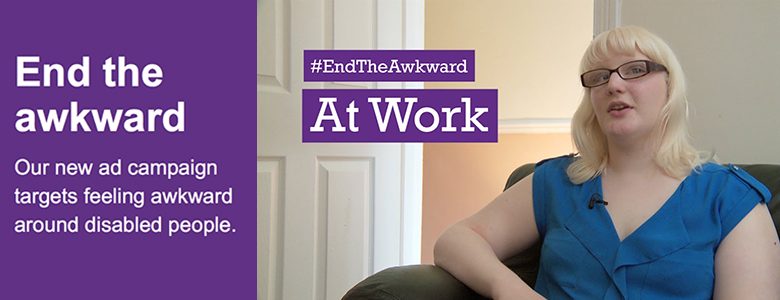
Starting a new job can be stressful, so here’s how to ‘end the awkward’
When you start a new job you should be excited, not worried how your new colleagues are going to react to your disability. These days, most people are clued up about disability, but sometimes you’ll come across colleagues or bosses who don’t know how to cope and will either make jokes, trip over their words, or assume you can’t do things without actually asking.
That’s why Scope have launched the End The Awkward campaign, to help put a stop to people feeling awkward around disability. After all, we’ve all met these people, the ones who feel they have to be funny in order to make themselves feel comfortable, or the ones who are so painfully polite and PC you almost wish they’d make an offensive joke just to lighten the mood.
So if you find yourself sitting next to one of these people at your new job, how do you put them at ease, break the ice, and end the awkward? By following our top tips of course!
The Office Joker
There’s one in every office, it might even be you, but while some office jokers like to play tricks on their colleagues, others use their humour to mask their insecurities. So how should you react if a colleague thinks it’s acceptable to make jokes about your disability? Firstly, you need to decide for yourself whether it is just an awkward attempt at humour from someone who doesn’t know how to deal with the situation, or something more sinister. If you feel your colleague has crossed the line then don’t hesitate to report them, but if you feel their ‘humour’ is just their self-consciousness getting the better of them, then there are a few things you can do to help them understand what is and what isn’t appropriate. Sometimes, it is just as simple as openly discussing your disability with them so that they feel less afraid of the situation. While it obviously isn’t your duty to make the whole world feel comfortable, this is sometimes the quickest and easiest way to resolve the problem. At other times though, depending on the type of humour you’re having to put up with, giving them a taste of their own medicine with a few choice jokes of your own is the best way to make them understand that their behaviour is inappropriate.
It’s Political Correctness Gone Mad!
Disability, what disability? On the other side of the coin there’s the type of person who’ll pretend they can’t see your disability at all. Not only will they completely ignore your PA because they think this will champion your rights, they’ll also love talking about ‘purple power’ and will take your side in every argument, whether you’re right or not. While having someone on your side isn’t necessarily a bad thing, being constantly reminded about your disability by someone who is so determined to treat you as an equal can actually make you feel the exact opposite. So what can you do in a situation like this?
First things first, if they’re ignoring your PA, take the time to formally introduce them and explain that while you are the one in charge, your PA is a human being too and not a servant that should be ignored. Once this is sorted out, you can approach the subject of your disability, and that while it is part of your life, it is not your defining feature. Chances are, when an overly PC person finds out they’ve been saying the wrong thing, they’ll be mortified, so tread carefully!
Assuming makes an Ass out of U and Me
“Oh sorry, I didn’t realise you could do that.” As the old saying goes, assuming does indeed make an ass out of u and me. There’ll always be someone who won’t know what you can and cannot do, and instead of asking you, will just assume on your behalf. Often they’re just trying too hard to be helpful, whether it’s pushing your wheelchair without you asking or assuming you need help crossing the road if you have a visual impairment. Breaking the ice with people like this and putting an end to the awkward is usually just a question of being upfront and open from the very beginning. If they’ve assumed that you can’t do something, pull them up on it and inform them that if you can’t do it, you will ask for help, but if you don’t, then they should rightly assume that you are perfectly capable.
No one expects the Spanish Inquisition
“Can you, you know, have sex?” There are some questions you expect to hear when you start a new job, such as “where did you work before?” or “do you want to come to the pub?” but very personal questions about your private life and your disability shouldn’t be on the list. People are curious by nature of course, and nothing makes a person more curious than someone who is different from them, but just as curiosity killed the cat, there is no surer way to destroy working relationships than by asking someone personal questions about their disability. So what do you do if an otherwise nice colleague is asking you intimate questions about your sex life or your bathroom habits? One of the easiest ways to make people realise that they’re being inappropriate is to turn the tables and see how they react to a similar line of questioning. If this doesn’t do the trick though, you might have to just be up front with them and tell them they need to get to know you better before asking those sorts of questions. Slow and steady wins the race.
Have you got any of your own awkward job stories you’d like to share? Why not join the conversation and offer up your own advice on how to end the awkward on Scope’s online community board.